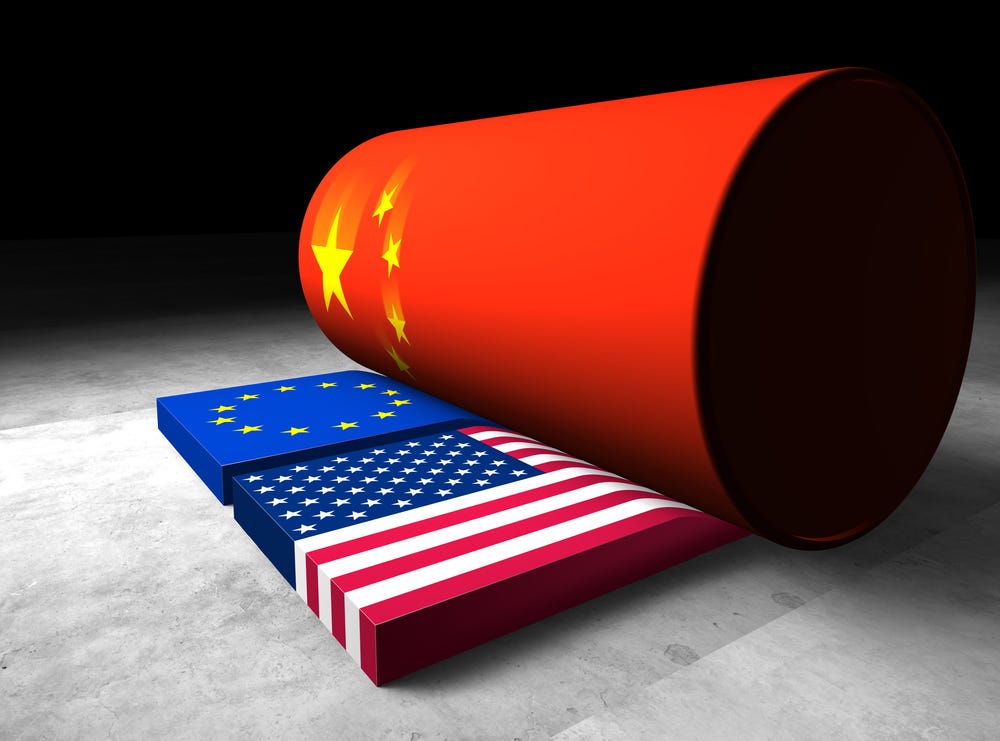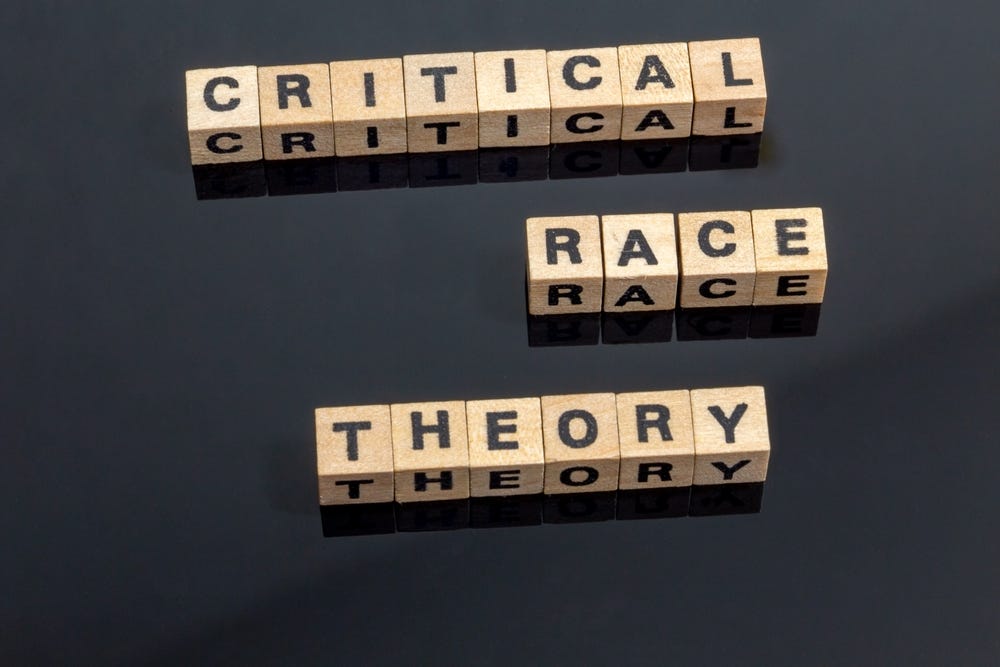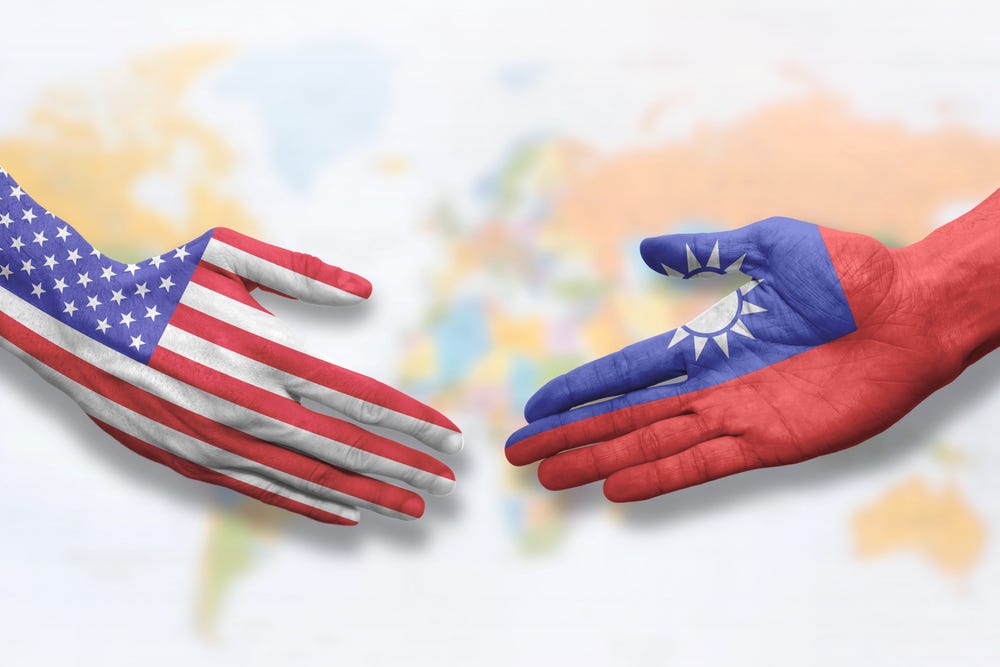E-Pluribus | November 24, 2021
China's growing ambition and its threat to democracy, a teacher's CRT alternative, and should America commit to defend Taiwan.
A round up of the latest and best writing and musings on the rise of illiberalism in the public discourse:
Danielle Pletka: What Are the Chinese After? Everything.
Although China’s threats against and pressure on Hong Kong and Taiwan may be its most headline-grabbing anti-democratic moves, the communist government’s tentacles are slithering around the world in less visible ways. At The Dispatch, Danielle Pletka takes a look at the CCP’s broad range of interests and acquisitions that are raising concerns through the free world. Unfortunately, that concern has not resulted in any agreement about the best way to react or resist.
The question, as ever, is what to do about it. And as liberal democracies zero in on the growing threat posed by an expansionist, aggressive, and increasingly dictatorial Chinese Communist Party, there are myriad ideas, a growing consensus that “something” must be done. But there is almost no consensus on “what” must be done.
[…]
What are the Chinese after? Well, everything. Billions of oil and gas investments in Mozambique. Billions in non-traditional oil and gas projects in the United States. Shale in Canada. Egypt. Kazakhstan. Dozens and dozens of oil projects in Iraq. In short, Chinese overseas oil production is growing by leaps and bounds (in many cases, the Chinese state-owned companies are seeking to buy these assets from U.S. companies, particularly in Iraq). Some of these investments are direct Chinese state or state-subsidized purchases of foreign petrocarbon and alternative assets; some are indirect efforts to control key infrastructural sectors through Belt and Road debt trap diplomacy (see for example, Hambantota International Port in Sri Lanka).
Ideas about how to address the problem run the gamut. Some have suggested revitalizing CoCom (the Coordinating Committee for Multilateral Export Controls) that regulated arms exports during the Cold War. But CoCom was succeeded by the much weaker Wassenaar Arrangement, which is more committed to transparency than it is to regulating sales of militarily useful products, let alone combating Chinese aggression. (Not to speak of the fact that Russia is actually a member of Wassenaar.) Others have suggested beefing up Wassenaar and adding tech procurement to required disclosures.
[…]
None of these ideas are terrible, and some may actually limit Chinese investment and theft and slightly stymie its defense build-up. But—and this is no searing insight—the devil is the details. Nations don’t want to stop doing business with China, because it’s lucrative and necessary. Theoretically, dividing desirable, non-dual-use like plastic toys or file cabinet exports from Huawei switching equipment and military drones should be possible. But it all demands leadership, unlikely from a Washington preoccupied with spending trillions and adjudicating kindergarten curricula. Nor will Europe step up to the plate, having retreated more with each passing year. Those directly in China’s gun sights—Japan and Australia and India—have increased their coordination and sharpened their defenses. But that alone will not address a global Chinese effort to infiltrate Western economies, defense industries, and international organizations.
Read it all.
Daniel Buck: Here’s What I Teach Instead of Critical Race Theory
Many conservatives and even some liberals have decried the influence Critical Race Theory is having on public education. Daniel Buck, a teacher himself, writes at National Review on how he addresses the concerns raised by CRT advocates in his classroom without actually subscribing to CRT’s ideology.
Well, I’m against CRT, and I’m a teacher. I’ve written about the ubiquity and radicalism of CRT elsewhere. My intent here is not to discredit CRT directly. Reading CRT scholarship discredits itself. Rather, I present here what I teach to my class to show that accepting CRT and rejecting accurate history is a silly false dichotomy, as so much of this debate is.
I open my classroom to you, dear reader, and I will let you decide. Is this a whitewashing of history?
Right now, my students are reading Frederick Douglass’s autobiography. It’s graphic. It presents to the reader an unfiltered view of slavery. I’ve seen the textbooks with the smiling slaves before; they’re offensive. Douglass’s autobiography is no such euphonious textbook. A brilliant writer, Douglass paints in every graphic detail the torn-skin and broken-body reality of American slavery.
[…]
My students learn about chattel slavery. They research specific Jim Crow laws. Alongside these lessons, they also read the specific words and rhetoric of Martin Luther King Jr. — not pulled quotes but the entire text of Letter from a Birmingham Jail. Through these authors, they learn about race and history. But they also analyze the rhetoric, repetition, and allusions from King. We revel in individual lines of brilliance from Douglass. We enjoy the imagery and lyricism of Langston Hughes.
[…]
A few students tell me every year that they didn’t know some moment in American history was as bad as they say. They didn’t realize how violent slavery or Jim Crow was. But I do not leave it there.
Alongside these poems, stories, and narratives, we also read the Constitution, the Declaration, and excerpts from Federalist No. 10. We read the words of Martin Luther King Jr: “The Emancipation Proclamation was the offspring of the Declaration of Independence.”
They learn that slavery was an abhorrent system that continued in spite of, not in line with, the ideals in our founding documents. They learn from Lincoln that Confederate leaders repudiated these founding ideas as “glittering ideals” and “self-evident lies.” They learn that America allowed a system of injustice for years but did so hypocritically, and that our continued realization of equality is a fulfillment of our Founding, not a rejection of it.
Read it all here.
Roger F. Wicker: Joe Biden Should Come Out and Say It: America Will Help Defend Taiwan
As noted in Item #1 above, China’s power and ambitions are raising concern around the globe, but the CCP has of late ratcheted up threatening rhetoric against Taiwan in particular. Mississippi Republican Senator Roger Wicker at the Wall Street Journal makes the case that President Biden should remove all doubt from the question of whether or not the US will militarily defend the island nation if China invades.
China is amassing military power at an alarming pace. It is increasingly obvious that the longstanding U.S. policy of “strategic ambiguity”—refusing to commit to helping Taiwan in the event of a Chinese military invasion—no longer serves our national interests. China’s strident behavior evinces a level of seriousness and a narrowing time horizon for action. If there is any hope of deterring war with China and protecting our Taiwanese friends, it is imperative that the Biden administration and Congress make American strategy clear.
Many leading U.S. defense planners can see the Chinese moving on Taiwan in the next six years, a concept known as the “Davidson Window,” after former Indo-Pacific chief Adm. Phil Davidson, who warned Congress about such a timeline. But several stunning displays of force from the Chinese military this summer—testing hypersonic missiles, building nuclear silos and surging aircraft near Taiwanese airspace—have likely reduced that six-year horizon. China’s naval capabilities, the cornerstone of any invasion force, are significantly outpacing our own. China’s enhanced space capabilities could hinder our military in the runup to a Chinese operation.
There are also troubling domestic trends in China: Demographic and economic growth have stalled and may crash in the coming decades. China also lacks easy access to the resources needed to sustain long-term competition with the U.S. Capturing Taiwan’s economy, with its semiconductor industry, could be the ace in the hole China needs to revive its economic fortunes and claim permanent superpower status.
Xi Jinping also has ideological reasons to invade Taiwan. Mr. Xi’s toxic brand of hypernationalism demands that he enshrine his legacy by “reunifying” China through a hostile invasion, which he has vowed to do. Moreover, Taiwan’s flourishing as an independent nation is a powerful and public refutation to Mr. Xi’s claim that liberal democracy is incompatible with Chinese culture.
Read the whole thing.
Around Twitter
A few thoughts from Noam Blum on cancel culture:
Colin Wright on how opposition to “wokeness” is not a “single issue” given the ultimate goals and reach of woke ideology:
Via Peter Boghossian, an interview with John Cleese of Monty Python fame on wokeness, creativity and freedom:
And finally, “privilege,” also via Peter Boghossian:









